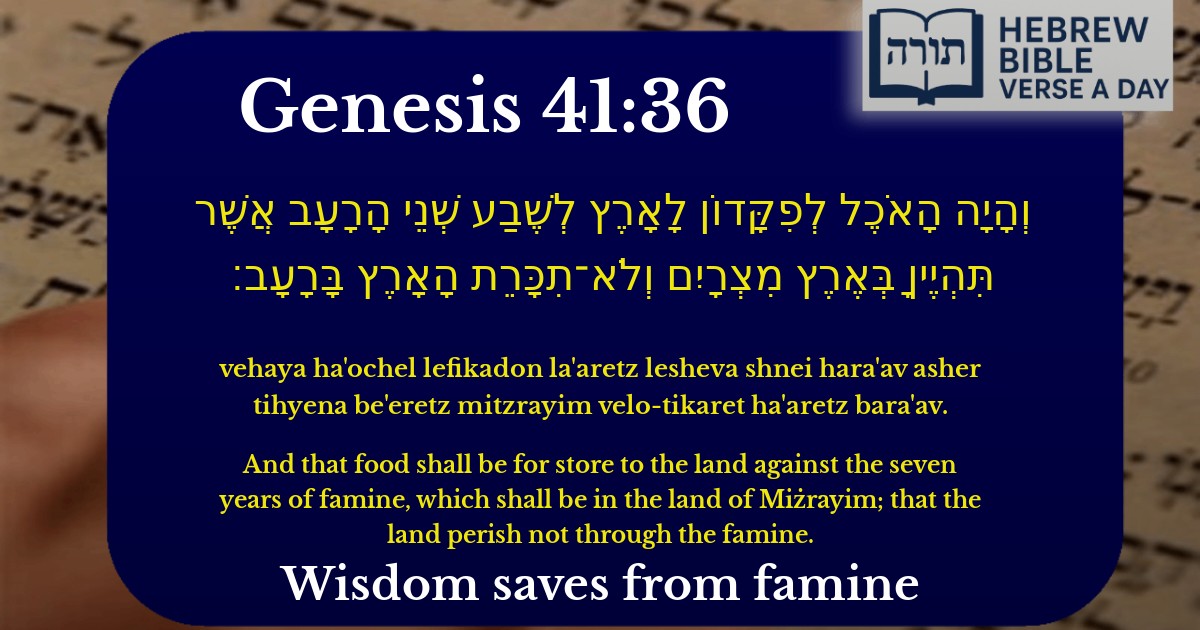Join Our Newsletter To Be Informed When New Videos Are Posted
Join the thousands of fellow Studends who rely on our videos to learn how to read the bible in Hebrew for free!
Hebrew Text
וְהָיָה הָאֹכֶל לְפִקָּדוֹן לָאָרֶץ לְשֶׁבַע שְׁנֵי הָרָעָב אֲשֶׁר תִּהְיֶיןָ בְּאֶרֶץ מִצְרָיִם וְלֹא־תִכָּרֵת הָאָרֶץ בָּרָעָב׃
English Translation
And that food shall be for store to the land against the seven years of famine, which shall be in the land of Miżrayim; that the land perish not through the famine.
Transliteration
Vehaya ha'ochel lefikadon la'aretz lesheva shnei hara'av asher tihyena be'eretz mitzrayim velo-tikaret ha'aretz bara'av.
Hebrew Leining Text
וְהָיָ֨ה הָאֹ֤כֶל לְפִקָּדוֹן֙ לָאָ֔רֶץ לְשֶׁ֙בַע֙ שְׁנֵ֣י הָרָעָ֔ב אֲשֶׁ֥ר תִּהְיֶ֖יןָ בְּאֶ֣רֶץ מִצְרָ֑יִם וְלֹֽא־תִכָּרֵ֥ת הָאָ֖רֶץ בָּרָעָֽב׃
וְהָיָ֨ה הָאֹ֤כֶל לְפִקָּדוֹן֙ לָאָ֔רֶץ לְשֶׁ֙בַע֙ שְׁנֵ֣י הָרָעָ֔ב אֲשֶׁ֥ר תִּהְיֶ֖יןָ בְּאֶ֣רֶץ מִצְרָ֑יִם וְלֹֽא־תִכָּרֵ֥ת הָאָ֖רֶץ בָּרָעָֽב׃
🎵 Listen to leining
Parasha Commentary
📚 Talmud Citations
This verse is not quoted in the Talmud.


Context of the Verse
This verse (Bereshit 41:36) is part of Yosef's interpretation of Pharaoh's dreams and his subsequent advice on how to prepare for the upcoming seven years of famine. Yosef advises storing grain during the seven years of plenty to sustain the land during the years of scarcity.
Rashi's Explanation
Rashi comments on the phrase "לְפִקָּדוֹן לָאָרֶץ" ("for store to the land"), explaining that the stored food will serve as a deposit (פיקדון) for the land, ensuring its survival during the famine. He emphasizes that this measure will prevent the land from being "תִכָּרֵת" ("cut off" or destroyed) due to starvation.
Rambam's Perspective
Rambam (Hilchot Matnot Aniyim 9:3) derives from this verse a broader principle of השגחה פרטית (Divine Providence) and human responsibility. Yosef's plan reflects the Torah's emphasis on foresight and preparation, teaching that one must take practical steps to mitigate future hardships, even when trusting in Hashem's providence.
Midrashic Insights
Halachic Implications
The Sifrei (Devarim 15:9) connects this verse to the mitzvah of תַּעֲנִיב (lending to the poor), teaching that just as Yosef ensured the preservation of life through stored food, we are obligated to assist others in times of need. This aligns with the broader Torah principle of לא תעמוד על דם רעך (not standing idly by while others suffer).
Symbolic Interpretation
The Kli Yakar suggests that the seven years of plenty and famine symbolize the cycles of spiritual abundance and scarcity. Just as physical sustenance was stored for lean times, one must "store" Torah and mitzvot during periods of spiritual strength to endure challenges.